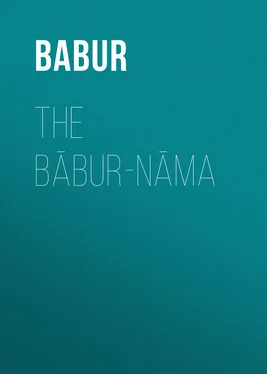Babur - The Bābur-nāma
Здесь есть возможность читать онлайн «Babur - The Bābur-nāma» — ознакомительный отрывок электронной книги совершенно бесплатно, а после прочтения отрывка купить полную версию. В некоторых случаях можно слушать аудио, скачать через торрент в формате fb2 и присутствует краткое содержание. Жанр: foreign_antique, foreign_prose, на английском языке. Описание произведения, (предисловие) а так же отзывы посетителей доступны на портале библиотеки ЛибКат.
- Название:The Bābur-nāma
- Автор:
- Жанр:
- Год:неизвестен
- ISBN:нет данных
- Рейтинг книги:4 / 5. Голосов: 1
-
Избранное:Добавить в избранное
- Отзывы:
-
Ваша оценка:
- 80
- 1
- 2
- 3
- 4
- 5
The Bābur-nāma: краткое содержание, описание и аннотация
Предлагаем к чтению аннотацию, описание, краткое содержание или предисловие (зависит от того, что написал сам автор книги «The Bābur-nāma»). Если вы не нашли необходимую информацию о книге — напишите в комментариях, мы постараемся отыскать её.
The Bābur-nāma — читать онлайн ознакомительный отрывок
Ниже представлен текст книги, разбитый по страницам. Система сохранения места последней прочитанной страницы, позволяет с удобством читать онлайн бесплатно книгу «The Bābur-nāma», без необходимости каждый раз заново искать на чём Вы остановились. Поставьте закладку, и сможете в любой момент перейти на страницу, на которой закончили чтение.
Интервал:
Закладка:
( Author’s note on Khwāja Maulānā-i-qāẓī. ) He was the son of Sl. Aḥmad Qāẓī, of the line of Burhānu’d-dīn ‘Alī Qīlīch 179and through his mother, traced back to Sl. Aīlīk Māẓī . 180By hereditary right ( yūsūnlūq ) his high family ( khānwādalār ) must have come to be the Refuge ( marji‘ ) and Pontiffs ( Shaikhu’l-islām ) of the (Farghāna) country.
Meantime Sl. Aḥmad Mīrzā took Aūrā-tīpā, Khujand and Marghīnān, came on to Qabā, 1814 yīghāch from Andijān and there made halt. At this crisis, Darwesh Gau, one of the Andijān notables, was put to death on account of his improper proposals; his punishment crushed the rest.
Khwāja Qāẓī and Aūzūn (Long) Ḥasan, 182(brother) of Khwāja Ḥusain, were then sent to Sl. Aḥmad Mīrzā to say in effect that, as he himself would place one of his servants in the country and as I was myself both a servant and (as) a son, he would attain his end most readily and easily if he entrusted the service to me. He was a mild, weak man, of few words who, without his begs, decided no opinion or compact ( aun ), action or move; they paid attention to our proposal, gave it a harsh answer and moved forward.
But the Almighty God, who, of His perfect power and without mortal aid, has ever brought my affairs to their right issue, made such things happen here that they became disgusted at having advanced ( i. e. from Qabā), repented indeed that they had ever set out on this expedition and turned back with nothing done.
One of those things was this: Qabā has a stagnant, morass-like Water, 183passable only by the bridge. As they were many, there was crowding on the bridge and numbers of horses and camels were pushed off to perish in the water. This disaster recalling the one they had had three or four years earlier when they were badly beaten at the passage of the Chīr, they gave way to fear. Another thing was that such a murrain broke out amongst their horses that, massed together, they began to die off in bands. 184Another was that they found in our soldiers and peasants a resolution and single-mindedness such as would not let them flinch from making offering of their lives 185so long as there was breath and power in their bodies. Need being therefore, when one yīghāch from Andijān, they sent Darwesh Muḥammad Tarkhān 186to us; Ḥasan of Yaq’ūb went out from those in the fort; the two had an interview near the Praying Place and a sort of peace was made. This done, Sl. Aḥmad Mīrzā’s force retired.
Meantime Sl. Maḥmūd Khān had come along the north of the Khujand Water and laid siege to Akhsī. 187In Akhsī was Jahāngīr Mīrzā (aet. 9) and of begs, ‘Alī-darwesh Beg, Mīrzā Qulī Kūkūldāsh , Muḥ. Bāqir Beg and Shaikh ‘Abdu’l-lāh, Lord of the Gate. Wais Lāgharī and Mīr Ghiyās̤ T̤aghāī had been there too, but being afraid of the (Akhsī) begs had gone off to Kāsān, Wais Lāgharī’s district, where, he being Nāṣir Mīrzā’s guardian, the Mīrzā was. 188They went over to Sl. Maḥmūd Khān when he got near Akhsī; Mīr Ghiyās̤ entered his service; Wais Lāgharī took Nāṣir Mīrzā to Sl. Aḥmad Mīrzā, who entrusted him to Muh. Mazīd Tarkhān’s charge. The Khān, though he fought several times near Akhsī, could not effect anything because the Akhsī begs and braves made such splendid offering of their lives. Falling sick, being tired of fighting too, he returned to his own country ( i. e. Tāshkīnt).
For some years, Ābā-bikr Kāshgharī Dūghlāt , 189bowing the head to none, had been supreme in Kāshgar and Khutan. He now, moved like the rest by desire for my country, came to the neighbourhood of Aūzkīnt, built a fort and began to lay the land waste. Khwāja Qāzī and several begs were appointed to drive him out. When they came near, he saw himself no match for such a force, made the Khwāja his mediator and, by a hundred wiles and tricks, got himself safely free.
Throughout these great events, ‘Umar Shaikh Mīrzā’s former begs and braves had held resolutely together and made daring offer of their lives. The Mīrzā’s mother, Shāh Sult̤ān Begīm, 190and Jaḥāngīr Mīrzā and the ḥaram household and the begs came from Akhsī to Andijān; the customary mourning was fulfilled and food and victuals spread for the poor and destitute. 191
In the leisure from these important matters, attention was given to the administration of the country and the ordering of the army. The Andijān Government and control of my Gate were settled ( mukarrar ) for Ḥasan (son) of Yaq’ūb; Aūsh was decided on ( qarār ) for Qāsim Qūchīn ; Akhsī and Marghīnān assigned ( ta’īn ) to Aūzun Ḥasan and ‘Alī-dost T̤aghāī. For the rest of ‘Umar Shaikh Mīrzā’s begs and braves, to each according to his circumstances, were settled and assigned district ( wilāyat ) or land ( yīr ) or office ( mauja ) or charge ( jīrga ) or stipend ( wajh ).
When Sl. Aḥmad Mīrzā had gone two or three stages on his return-march, his health changed for the worse and high fever appeared. On his reaching the Āq Sū near Aūrā-tīpā, he bade farewell to this transitory world, in the middle of Shawwāl of the date 899 (mid July 1494 AD.) being then 44 (lunar) years old.
m. Sl. Aḥmad Mīrzā’s birth and descent.
He was born in 855 AH. (1451 AD.) the year in which his father took the throne ( i. e. Samarkand). He was Sl. Abū-sa‘īd Mīrzā’s eldest son; his mother was a daughter of Aūrdū-būghā Tarkhān ( Arghūn ), the elder sister of Darwesh Muḥammad Tarkhān, and the most honoured of the Mīrzā’s wives.
n. His appearance and habits.
He was a tall, stout, brown-bearded and red-faced man. He had beard on his chin but none on his cheeks. He had very pleasing manners. As was the fashion in those days, he wound his turban in four folds and brought the end forward over his brows.
o. His characteristics and manners.
He was a True Believer, pure in the Faith; five times daily, without fail, he recited the Prayers, not omitting them even on drinking-days. He was a disciple of his Highness Khwāja ‘Ubaidu’l-lāh ( Aḥrārī ), his instructor in religion and the strengthener of his Faith. He was very ceremonious, particularly when sitting with the Khwāja. People say he never drew one knee over the other 192at any entertainment of the Khwāja. On one occasion contrary to his custom, he sat with his feet together. When he had risen, the Khwāja ordered the place he had sat in to be searched; there they found, it may have been, a bone. 193He had read nothing whatever and was ignorant ( ‘amī ), and though town-bred, unmannered and homely. Of genius he had no share. He was just and as his Highness the Khwāja was there, accompanying him step by step, 194most of his affairs found lawful settlement. He was true and faithful to his vow and word; nothing was ever seen to the contrary. He had courage, and though he never happened to get in his own hand to work, gave sign of it, they say, in some of his encounters. He drew a good bow, generally hitting the duck 195both with his arrows ( aūq ) and his forked-arrows ( tīr-giz ), and, as a rule, hit the gourd 196in riding across the lists ( maidān ). Latterly, when he had grown stout, he used to take quail and pheasant with the goshawks, 197rarely failing. A sportsman he was, hawking mostly and hawking well; since Aūlūgh Beg Mīrzā, such a sporting pādshāh had not been seen. He was extremely decorous; people say he used to hide his feet even in the privacy of his family and amongst his intimates. Once settled down to drink, he would drink for 20 or 30 days at a stretch; once risen, would not drink again for another 20 or 30 days. He was a good drinker; 198on non-drinking days he ate without conviviality ( basīt̤ ). Avarice was dominant in his character. He was kindly, a man of few words whose will was in the hands of his begs.
Читать дальшеИнтервал:
Закладка:
Похожие книги на «The Bābur-nāma»
Представляем Вашему вниманию похожие книги на «The Bābur-nāma» списком для выбора. Мы отобрали схожую по названию и смыслу литературу в надежде предоставить читателям больше вариантов отыскать новые, интересные, ещё непрочитанные произведения.
Обсуждение, отзывы о книге «The Bābur-nāma» и просто собственные мнения читателей. Оставьте ваши комментарии, напишите, что Вы думаете о произведении, его смысле или главных героях. Укажите что конкретно понравилось, а что нет, и почему Вы так считаете.











